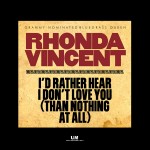
Larry Cordle



Single Review: Rhonda Vincent, "I'd Rather Hear I Don't Love You (Than Nothing At All)"

Written by Henry L. Carrigan, Jr. of Engine 145
From the moment Hunter Berry’s tearful-sounding fiddle plaintively whines the first four bars of Rhonda Vincent’s new single, we know we’re in for a sad country shuffle. In fact, the notes he strikes on the fiddle anticipate almost note-for-note Vincent’s emphatic, but mournful, tone in her first lines and the song’s chorus. Vincent’s soaring vocals, backed by those doleful fiddles and the pleading resophonic guitar of Brent Burke, deliver a sorrowful breakup song with a twist.

Album Review: Kathy Mattea, <i>Calling Me Home</i>

Kathy Mattea
Calling Me Home
On her exquisite new album Calling Me Home, Kathy Mattea shows herself to be an artist who fully understands music as a medium of art and self-expression. Following down a path similar to that of her stellar Grammy-nominated 2008 effort Coal, but expanding upon it by dealing with a wider range of topics, Calling Me Home finds Mattea turning to her own roots for inspiration, and producing what just might be the finest album of her illustrious career.

Traditional Country is a Link in a Long Chain
The following is a guest contribution from Scott O’Brien.
“But someone killed tradition. And for that someone should hang.” –Larry Cordle & Larry Shell, “Murder on Music Row”
Dan Milliken’s recent post got me thinking: The country music I grew up with is nothing like the music on country radio today. If I turned on today’s country radio in 1988, I might not realize it was a country station and keep right on flipping. Back then, Randy Travis and Keith Whitley’s traditional twang ruled the airwaves. Today, they are dominated by the giggly teeny-bopper ditties of Taylor Swift and the boy band sounds of Rascal Flatts. Did they get away with murder on music row? Well, let’s start by briefly uncovering country’s traditional roots.
What is traditional country music? Is it simply anything from the past? That seems too broad; Shania Twain wasn’t traditional. Anything before 1990? Maybe, but that is still a rather wide net. To me, traditional country music is honky-tonk music. It heavily employs steel guitars, fiddles, and forlorn vocals. It moves at a slow pace. There are no drums or electric guitars. The songs typically deal with heavy topics such as heartbreak, cheating, or drinking, with a ballad here and there. In most cases, the goal is to induce pain. Not bad pain, but the therapeutic empathy that tugs your heart and helps you through your personal struggles. The patron saint of traditional country is Hank Williams. Hank’s first disciple is George Jones. Jones’ first disciple is Alan Jackson. The traditional template is supposed to help us decipher what is country and what is not. After all, what makes country music country if not fiddles and cheatin’ songs?
